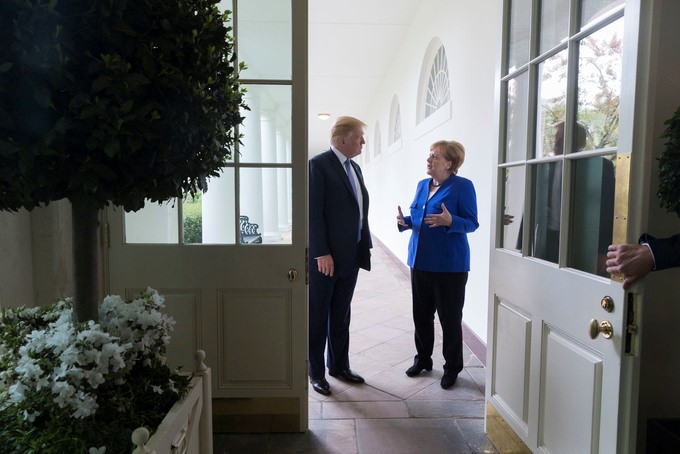AGI News
Germany in Trump’s Crosshairs

Official White House Photo by Shealah Craighead

Stephen F. Szabo
Senior Fellow
Dr. Stephen F. Szabo is a Senior Fellow at AICGS, where he focuses on German foreign and security policies and the new German role in Europe and beyond. Until June 1, he was the Executive Director of the Transatlantic Academy, a Washington, DC, based forum for research and dialogue between scholars, policy experts, and authors from both sides of the Atlantic. Prior to joining the German Marshall Fund in 2007, Dr. Szabo was Interim Dean and Associate Dean for Academic Affairs and taught European Studies at The Paul H. Nitze School of Advanced International Studies, Johns Hopkins University. He served as Professor of National Security Affairs at the National War College, National Defense University (1982-1990). He received his PhD in Political Science from Georgetown University and has been a fellow with the Alexander von Humboldt Stiftung, the Woodrow Wilson International Center for Scholars, and the American Academy in Berlin, as well as serving as Research Director at AICGS. In addition to SAIS, he has taught at the Hertie School of Governance, Georgetown University, George Washington University, and the University of Virginia. He has published widely on European and German politics and foreign policies, including. The Successor Generation: International Perspectives of Postwar Europeans, The Diplomacy of German Unification, Parting Ways: The Crisis in the German-American Relationship, and Germany, Russia and the Rise of Geo-Economics.
Read in German from the Frankfurter Allgemeine Zeitung
After the most recent visit to Washington by Chancellor Merkel in April, a German diplomat came away from the brief working meeting with the president with the clear conclusion that “Trump views Germany as the enemy.” Events since then have only confirmed this assessment. The recent debacle at the NATO summit and the president’s tweets and those of his ambassador in Berlin have escalated the anti-German, anti-EU, and anti-Merkel rhetoric to depths never seen before in the German-American relationship.
Why has this American president continued to undermine all the pillars of U.S. policy toward the European Union and specifically Germany? Trump has long believed that the Atlantic alliance cost America while it benefitted Europe and especially Germany. Trump views the world in the same zero-sum terms as Vladimir Putin. Nations either win or lose in relationships and alliances only dilute the national sovereignty of Great Powers. Alliances are a way for the weak to free-ride off of the strong. Nations are defined culturally, and national cultures are undermined by globalist cosmopolitans. Trump sees both Germany and Chancellor Merkel as the leading examples of free-riders who take advantage of America while undermining national identity and cohesion. On the other hand, he and much of the American right are closer to Putin than to Merkel, Macron, or the leadership of the EU. The close links between Trump and Stephen Bannon to right-wing populists in Europe, including the AfD, make it clear that this is more a war on Germany than on a Europe it sees moving in its direction.
It should be noted that Germany and its leadership share some responsibility for this state of affairs. German governments have consistently underfunded defense, a trend which goes back to the 1990s. The Bundeswehr is in a woeful state with major equipment shortages and maintenance deficiencies. Combine this with soaring current accounts, trade and budget surpluses, and Trump has a case (made by President Obama as well) that Germans should seriously address. However, unlike his predecessors he really does not want to reform or renew the transatlantic relationship, but rather to free the United States from its burdens and to follow a Great Power set of bilateral relations with Russia, China, and other major sovereign nations. It is disingenuous for Trump to urge Europeans to do more on defense while seeming to take away the Russia threat from the alliance and replace it with the threat of economic war. The fact that Chancellor Merkel has been the main figure in shaping and maintaining the European sanctions regime on Russia contradicts the Trump attack on what he characterizes as German dependence on Russia for energy. Here again he seems to be more concerned about selling Germany natural gas than resisting Russian pressures on Europe.
While the president’s views are bad enough, the lack of any serious push back by Republicans is astonishing and reflects the polarized nature of American politics. A poll released this week by the Washington Post finds that 74 percent of Republicans believe American leadership has gotten stronger under Trump while 80 percent of Democrats believe that Trump has weakened American leadership in the world. The same poll found that 66 percent of Republicans supported his handling of the recent summit meeting with Putin while 83 percent of Democrats opposed his behavior in Helsinki.
The recent visit by a delegation of Republican Senators to Moscow is just the latest example of this partisan divide over what was a consensus issue in American national security. Republicans have been firm supporters of both NATO and the European Project ever since Senator Vandenberg joined forces with the Truman administration to support the Marshall Plan. Republican leaders in states like Tennessee, Alabama, and South Carolina, where German companies (most related to car production) are now employing over 600,000 Americans will be hard hit by the threatened tariffs on the German automobile industry. The Harley Davidson push back will be minor in comparison to what will follow a war on European autos.
All this means Germany has to conduct an agonizing reappraisal of the assumptions of its relationship with the United States. While the chances of the Democrats regaining control in the House of Representatives in the fall elections are good, the Senate and the White House will remain in Republican hands. This means at least two more years of a Trump administration with a Republican Senate without such Atlanticists as McCain, Corker, and Flake in its membership. Most importantly, the idea that foreign policy should be bipartisan is dead, especially on the key issues related to Germany. The Trump war on Germany is part of a new American civil war and risks leaving an America alone at a time when it needs Germany as a partner in dealing with the China challenge.









